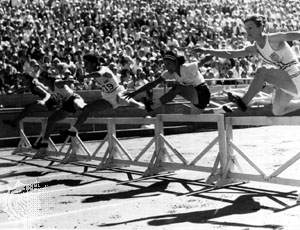 |
Los Angeles, California, United States, 1932
 |
|
Olympic posters from the Archives, Olympic Museum Lausanne,
from the book The Olympic Spirit,
published by Tehabi Books |
Only about 1,300 athletes, representing
37 countries, competed in the 1932 Games. The poor participation
was the result of the worldwide economic depression and the
expense of traveling to California. The Los Angeles Games featured
the first Olympic Village. The village was located in Baldwin
Hills, a suburb of Los Angeles, and covered 321 acres (130 hectares).
The male athletes were housed in over 500 bungalows and had
access to a hospital, a library, a post office, and 40 kitchens
serving a variety of cuisines. The female athletes stayed at
a downtown hotel. The Los Angeles Coliseum was expanded to seat
more than 100,000 people, and a new track was installed. Made
of crushed peat, the new surface was exceptionally fast, resulting
in 10 new world records in the running events. The 1932 Games
saw the first use of electronic timing and the photo-finish
camera.
 |
| Babe Didrikson (right) winning the 80-metre hurdles at the 1932 Olympic Games in Los Angeles |
| AP/Wide World
|
The star of the games was American "Babe"
Didrikson (later Zaharias). She had won five events at the U.S.
Olympic trials, but Olympic rules allowed women to compete in
no more than three. Didrikson competed in the 80-metre hurdles,
javelin, and high jump, winning two gold medals and a silver.
The U.S. team returned to its dominance of the track-and-field
events, winning 11 gold medals. American Eddie Tolan won the
100- and 200-metre runs. The first race-walking event was held
at the Los Angeles Games.
The Japanese swim team, composed almost entirely of teenagers,
won five of the six men's events. Kitamura Kusuo, who won the
gold medal in the 1,500-metre freestyle at age 14, became the
youngest male swimmer ever to win an Olympic event. American
women dominated in swimming, taking four of the five gold medals.
Helene Madison won gold medals in the 100- and 400-metre freestyle
races and earned a third gold as part of the U.S. relay team.
|
